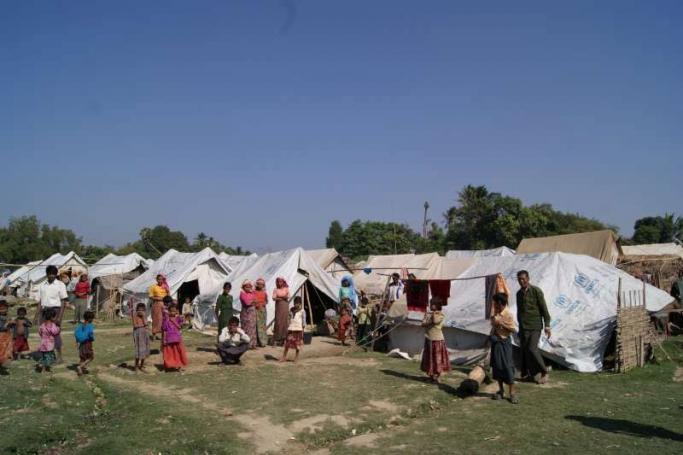Fortify Rights is calling for a full and independent investigation into the plight of the Rohingya Muslims in Myanmar’s Rakhine State. In a report entitled, “Persecution of Rohingya Muslims”, released on October 29, the rights group, in conjunction with Allard K Lowenstein International and Human Rights Clinic, Yale Law School, claims there is “strong evidence” to “infer genocidal intent by security forces, government officials, local Rakhine, and others.”
The findings were released alongside a year-long Al Jazeera report and investigation that highlights the abuse of Muslims in Rakhine State and some incidents perpetrated against Muslims in other parts of the country, primarily Meiktila.
Where this report goes further than any earlier investigations, including those of the United Nations human rights envoys is in investigating whether there is evidence of government involvement in the violence and threats made against the Rohingya community.
What it found was the major riots that broke out in 2012 were not communal riots. The findings of the report indicate the attacks on the Rohingya community were “orchestrated” with armed Buddhist men bussed in, fed and supported, and both police and military forces stood idly by, allowing the violence to unfold.
Highlights from the report include:
The 78-page legal analysis is the first to apply the law of genocide to the situation of the Rohingya in Myanmar.
It's based on nearly three years of research provided by Fortify Rights to the Allard K. Lowenstein International Human Rights Clinic at Yale Law School, including eyewitness and survivor testimony, internal government documents, internal UN documents, and other sources.
It alleges the Myanmar government committed abuses against the Rohingya with the intent to destroy the Rohingya "in whole or in part."
It names several responsible parties, including specific state security agencies, and establishes links to the central government, in committing genocidal acts.
It clarifies the distinction between motivation and intent under international law, to show that the intent requirement (as required to demonstrate genocide versus another crime, such as ethnic cleansing) may be met even when a perpetrator is motivated by unrelated goals, such as political or economic gains (or driving Rohingya from the country).
Fortify Rights is calling for the UN Human Rights Council to establish a Commission of Inquiry (COI) into international crimes committed against the Rohingya in Myanmar, including the crime of genocide. Looking at precedents in other contexts and based on conversations with certain UN officials, the likelihood of seeing a COI for the Rohingya is not as improbable as it maybe once was, says the NGO.
The NGO says this legal analysis assesses whether the abuses of Rohingya Muslims’ human rights in Myanmar’s Rakhine State amount to genocide. Part I presents a detailed historical account of the situation of the Rohingya since Myanmar’s independence. Part II applies the law of genocide to the treatment of Rohingya in Rakhine State. This Part considers three questions: First, do Rohingya constitute a protected group under the definition of genocide? Second, do the acts perpetrated against Rohingya fall into the categories enumerated in the Genocide Convention? Third, does the requisite “intent to destroy” Rohingya exist? This analysis concludes that Rohingya constitute a protected group and that the group has suffered enumerated acts. Although the analysis does not support a definitive answer to the third question, the information the Lowenstein Clinic has considered, assuming it is credible and comprehensive and accurately reflects the situation of the Rohingya in Myanmar, provides a strong foundation from which to infer genocidal intent by security forces, government officials, local Rakhine, and others. Thus, this paper finds persuasive evidence that the crime of genocide has been committed against Rohingya Muslims.
The legal analysis highlights the urgent need for a full and independent investigation and heightened protection for Rohingya Muslims in Myanmar’s Rakhine State.
As Fortify Rights points out, this analysis does not conclude definitively whether genocide is occurring. Such a conclusion would require a full and independent investigation by an appropriately authorized institution with investigatory powers and provisions for the accused to respond to allegations, the group says. However, assuming that the information to which the Lowenstein Clinic has had access is credible and comprehensive and accurately reflects the Rohingyas’ situation, the paper finds strong evidence that genocide is being committed against Rohingya.
The Genocide Convention, which was adopted by the General Assembly of the United Nations in 1948 and entered into force in 1951, declares that genocide is a crime under international law. It imposes affirmative legal obligations on states to prevent genocide from occurring and to punish perpetrators of genocide.
You are viewing the old site.
Please update your bookmark to https://eng.mizzima.com.
Mizzima Weekly Magazine Issue...
14 December 2023
Spring Revolution Daily News f...
13 December 2023
New UK Burma sanctions welcome...
13 December 2023
Spring Revolution Daily News f...
12 December 2023
Spring Revolution Daily News f...
11 December 2023
Spring Revolution Daily News f...
08 December 2023
Spring Revolution Daily News f...
07 December 2023
Diaspora journalists increasin...
07 December 2023
Myanmar migrant workers arrested in Mae Sot












